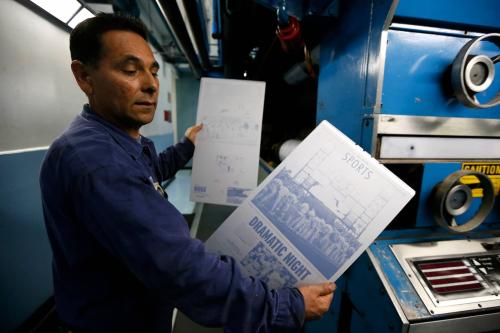The withdrawal from Iraq is progressing at a precipitous pace.
No, not the withdrawal of American troops. I’m talking about the withdrawal of the American news media.
While American troop strength in Iraq is being slowly reduced, the press corps there is being rapidly reduced. The raw numbers tell the story:
- Only four U.S. news organizations now staff bureaus in Baghdad, compared to a dozen in the early days of the war. CBS and NBC have no correspondents based in Iraq.
- The New York Times, Los Angeles Times, and Washington Post—which all continue to staff small Baghdad bureaus—published a total of 858 front-page stories from Iraq in 2003, but only 138 in the first nine months of this year. The three major American television networks broadcast 130 stories from Iraq between September 2007 and September 2008, compared to 242 stories in the previous 12 months.
- In September 2007, 219 U.S. journalists were “embedded” with American combat units. Last month, that number was only 39.
So, why the sharp drop-off in U.S. news coverage from Iraq?
Now that the story in Iraq has shifted from a daily litany of suicide car bombings, sectarian violence, and Americans soldiers killed, and turned instead into a focus on voter registration drives, campaigns for the Iraqi parliament, and reconciliation among previously warring factions, the American news media have lost interest.
The news media have concluded that their audiences also have lost interest, which may or may not be true. The current worldwide financial crisis certainly has become a primary focus of readers and viewers.
Part of the reason newspapers and networks have cut back on Iraq coverage has to do with the economics of journalism. Basically, newspaper readership and television viewership are declining, therefore advertising revenue is declining, therefore the publications and networks don’t have news-gathering budgets as big as they used to have to cover Iraq and other long-running stories.
And Iraq is an expensive story to cover: armored vehicles to buy or rent, protective clothing, hotel rooms and meals, etc. Private security guards alone can run $1,500 a day!
Another part of the explanation for declining news coverage from Baghdad is that it’s easier to cover a battle or car bombing than it is to cover the current complexities of forming a new government, establishing a legal framework for a continued U.S. presence, and dividing oil revenue among competing regions and sects.
And so, when the easy-to-cover car bombings decline, the coverage declines.
As Gen David G. Perkins, the chief U.S. military spokesman in Iraq, told the Washington Post: “There are a lot of things going on, a lot of very complicated things going on. And to cover that, you really have to understand the details and the sophistication of it. When you have a big explosion where 20 people die, it doesn’t take much understanding of the intricacies of what’s going on in the country to run out there with a camera and report that 20 people have been killed.”
Alissa J. Rubin, the acting New York Times bureau chief in Baghdad, reinforced that point when she told the Post that the situation there “remains important and remains interesting. But what’s in front of us now is almost a static situation. There’s not a clear narrative line. The stories are more complex.”
Producing stories which explore and explain the current complex situation in Iraq requires reporters with lots of on-the-ground experience. The number of such knowledgeable reporters is growing increasingly scarce in Iraq as newspapers and networks drastically reduce their coverage, or eliminate it entirely.
Yet another reason for the cutback in news coverage from Iraq is that the news media have a short attention span. After years of covering the Iraq war and its long aftermath, editors and producers are bored with the story. And so they have shifted their attention—and resources—to other stories.
Whether it’s the cause, or the effect, of this “I’m bored with the Iraq story” attitude by editors and producers, readers and viewers have also developed a short attention span. O.J. Simpson’s robbery conviction? Last week’s story. Sarah Palin’s daughter’s pregnancy? Last month’s story. The shootings at Virginia Tech? Last year’s story. Iraq? Is that story still around?
But it is vitally important that the news media continue to keep the American public informed and interested in what’s happening in Iraq. Iraq is just one battle in a longer war against militant Islamists who want to spread their philosophy and control to a much wider area. An analogy might be America’s long and unpopular Vietnam involvement, which, in hindsight, was just a battle in the much longer war that eventually toppled militant Communism.
If the news media lose interest in what’s going on in Iraq now and continue to reduce the coverage, the American people will lose interest in what’s going on in Iraq now, and that will cause America’s leaders to shift their attention to other issues which they believe voters are more interested in. This will certainly have unforeseen consequences in the long run.
There is one more explanation for the news media’s rapidly declining interest in what’s going on in Iraq. That final explanation can be summed up by a cynical expression journalists sometimes mutter to each other over drinks after work: “Good news is no news.”
Cynical? Yes.
True? Unfortunately, yes.



Commentary
Op-edThe News Media’s Withdrawal from Iraq
October 15, 2008